
Hallmark Holiday movies May Be on to Something When It Comes to Young People
Spoiler alert: Relational Authority is present
Now that I have the term Relational Authority in my back pocket for describing effective ways to build trust and form relationships, I seem to see its dimensions and practices reflected everywhere. Although listening, transparency, integrity, care, and expertise are by no means new values for adults to practice with and for young people, the unique combination — and how that combination works to help forge positive relationships – is popping up everywhere lately. Even in the most unexpected places and plots.
Take, for example, my (…and many others’) slight addiction to those so-bad-it’s-good holiday movies that appear out of nowhere around November 1. Though Hallmark may have started the trend, now these predictable stories — brimming with hot cocoa, small towns, snow and sledding, — are ubiquitous. Love, loss, redemption, and big fluffy snowflakes abound.
As a holiday-time crafter, I put these types of movies on in the background while I’m baking, sewing, or stitching something new. They make for excellent background viewing precisely because they more or less follow the same plot: inevitably, in each of these types of movies the main character has a crucial decision to make. Stay in Alaska or fly back to the big city? Choose new love or a potential promotion? Embark on a new entrepreneurial adventure or stay in the same old path? The wintery time of year in each is a mere backdrop to a story of crossroads, decision-making, and self-realization.
As these cheesy movies played in the background of my own holiday preparations, I noticed another pattern, something besides the crossroads and the cookies. I started to notice (that’s right, you guessed it!) the themes of Relational Authority. As these main characters pondered deep questions and difficult decisions, some sage companion, whether magical, maternal, or something else, speaks with guidance and wisdom in their life.
So, what is Relational Authority?
One of the core components in Springtide’s definition of Relational Authority is acknowledging the way we often prioritize expertise over relationships when it comes to earning trust. While in past generations, adults who led with expertise (degrees, titles etc.) were able to share their values, easily passing down to the next generation. Yet Springtide’s research has shown over and over that today’s young people need to know you care about them, first and foremost. This attentive concern is expressed through listening, transparency, integrity, care, and then fully realized through being able to share one’s expertise.
First, Listening
In these hokey holiday movies, (usually over a cup of hot cocoa, decorating cookies, or something equally stereotypical) the sage older person first listens–lending an ear while the main character confesses their pain, confusion, decision, or question. The trusted guide allows the main character time to talk—patiently listening, without judgment, or interruption. This mirrors Sal’s experience, who told us in our interview, “I’ve had plenty of good conversations because I could tell that they were listening to understand rather than listening to respond.”
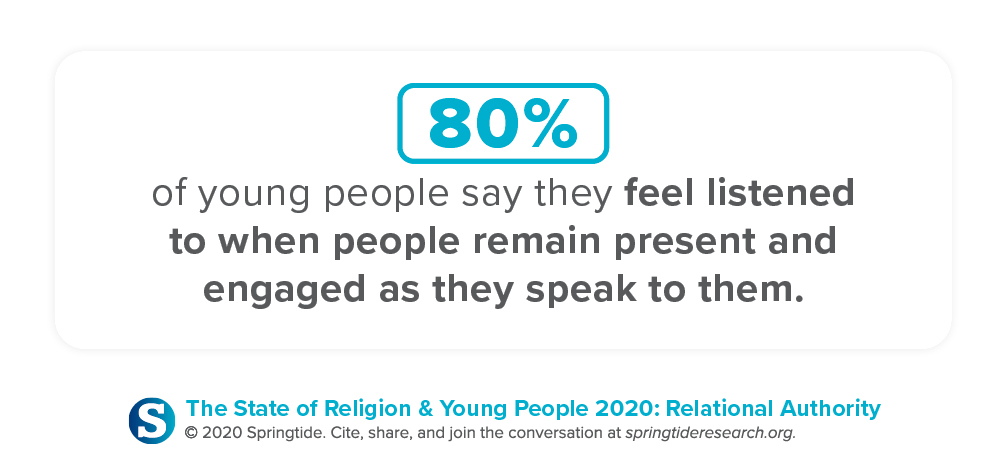
![]() Tide-Turning Tip: Put your phone away (even if the young person you’re talking to doesn’t). Develop comfort with pauses and silence, which can communicate that you’re digesting what they’ve said, and that you don’t have a ready-made response.
Tide-Turning Tip: Put your phone away (even if the young person you’re talking to doesn’t). Develop comfort with pauses and silence, which can communicate that you’re digesting what they’ve said, and that you don’t have a ready-made response.
Second, Transparency
Once the character has shared their struggle, then the wise sage pauses for a moment, and then shares some perfectly relatable anecdote about their own life, building a bridge of trust between the two. Rarely is it a vague oh, I’ve been there before, but rather a real story shared with real emotion. Again, this is what young people echo again and again—79% of young people surveyed trust someone who shares things about their life.
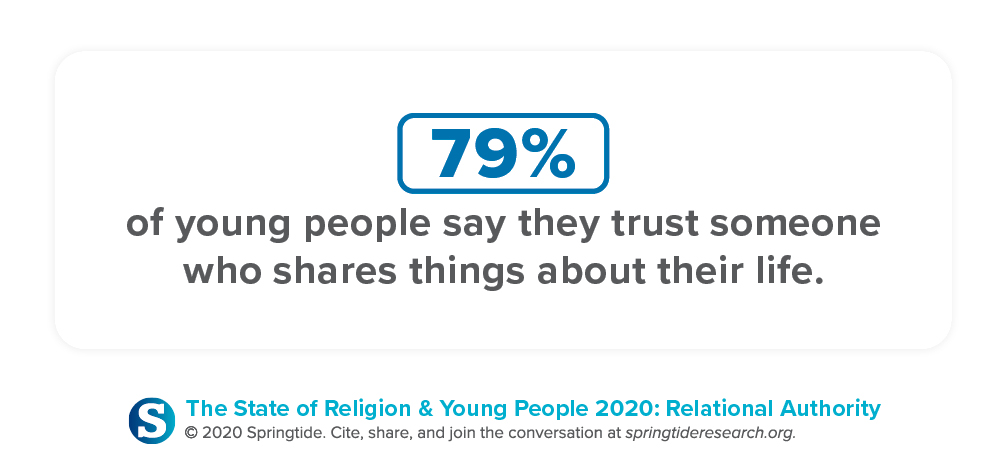
![]() Tide-Turning Tip: Seeking commonalities follows sharing experiences for a reason. It’s only when you start sharing that you can discover the nuanced ideas, hobbies, friends, or favorite foods to bond over. Because experience is a form of knowledge, having someone who has gone through similar things in life gives authority to speak into and from those places of shared understanding.
Tide-Turning Tip: Seeking commonalities follows sharing experiences for a reason. It’s only when you start sharing that you can discover the nuanced ideas, hobbies, friends, or favorite foods to bond over. Because experience is a form of knowledge, having someone who has gone through similar things in life gives authority to speak into and from those places of shared understanding.
Third, Integrity
The scene must move on, and so do the characters. Typically, I’ve noticed, the main character starts to slowly make their way toward the inevitable moment of truth: the crossroads on which the plot hinges. Perhaps there’s a misstep, wrong choice, or hesitation—but not for long. The trusted adult appears at the critical moment, not with words but with the gift of their presence: a reminder to the main character to do the right thing. This moment of presence reminds me of the third aspect of Relational Authority: integrity, which is all about following up and following through.
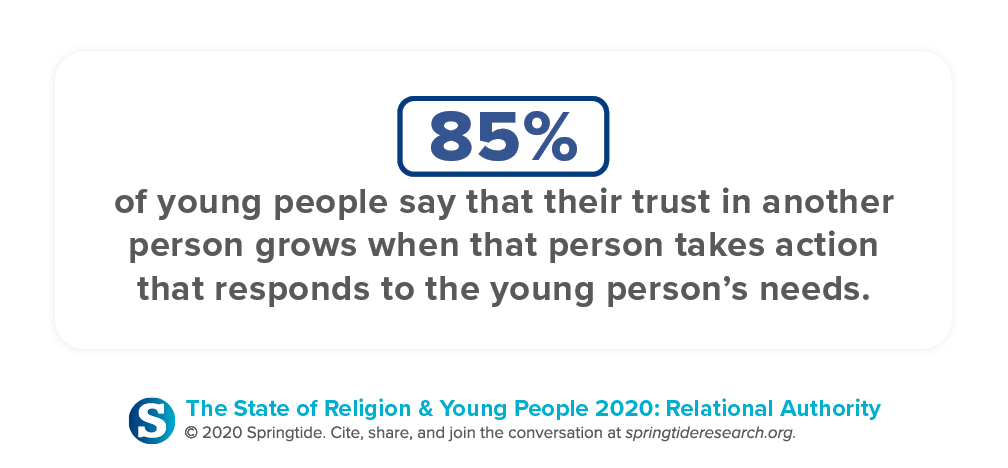
![]() Tide-Turning Tip: Following up with young people starts with remembering what was exchanged—a hallmark of listening and a foundational aspect of Relational Authority. Track events and milestones for each young person on a spreadsheet or list and set reminders. If they have a big test coming up, wish them luck just beforehand. If they are making a difficult decision, check in and offer to be a sounding board.
Tide-Turning Tip: Following up with young people starts with remembering what was exchanged—a hallmark of listening and a foundational aspect of Relational Authority. Track events and milestones for each young person on a spreadsheet or list and set reminders. If they have a big test coming up, wish them luck just beforehand. If they are making a difficult decision, check in and offer to be a sounding board.
Fourth, Care
Care is at the heart of these types of movies. As The State of Religion & Young People 2020 explains, “Care can be demonstrated in some of the ways we’ve discussed in previous sections on listening, transparency, and integrity. Things like following through on ideas or conversations, seeking commonalities, or showing genuine curiosity can all be acts of care. But unlike the other dimensions of Relational Authority, care is bigger than discrete actions.” Throughout these movies, the wise sage remembers what was shared and shows up in ways that demonstrate they truly have the main character’s best in mind. And this matters! Because 85% of young people tell us they are more likely to take advice from someone they know cares about them.
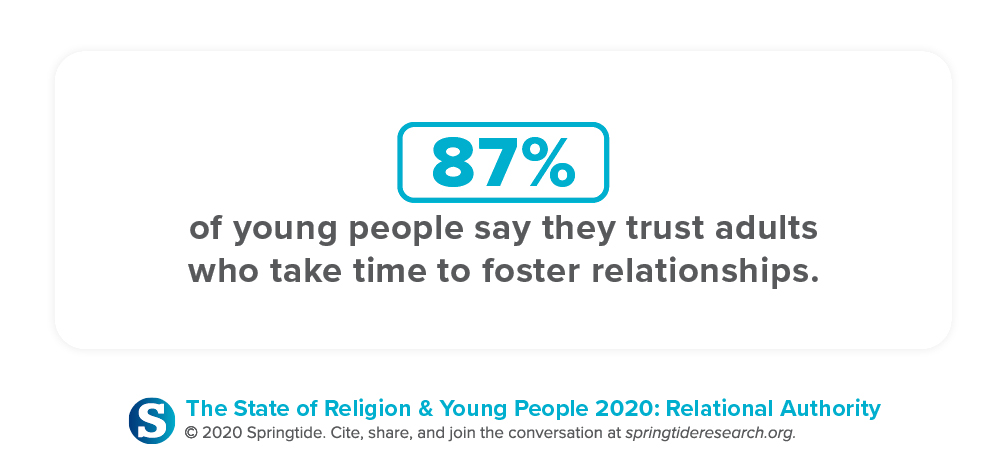
Fifth, Expertise
Predictably, there comes a time in these movies where some piece of advice is doled out that finally helps the main character make whatever decision is before them. This last dimension of Relational Authority is realized in this moment—because the trusted adult listened without judgment, shared their own experience with transparency, checked in using integrity, and demonstrated care throughout—we arrive at the when a trusted adult can not only impart their advice, but have it accepted.
Relational Authority is earned through listening, transparency, integrity and care. It is expressed through expertise.
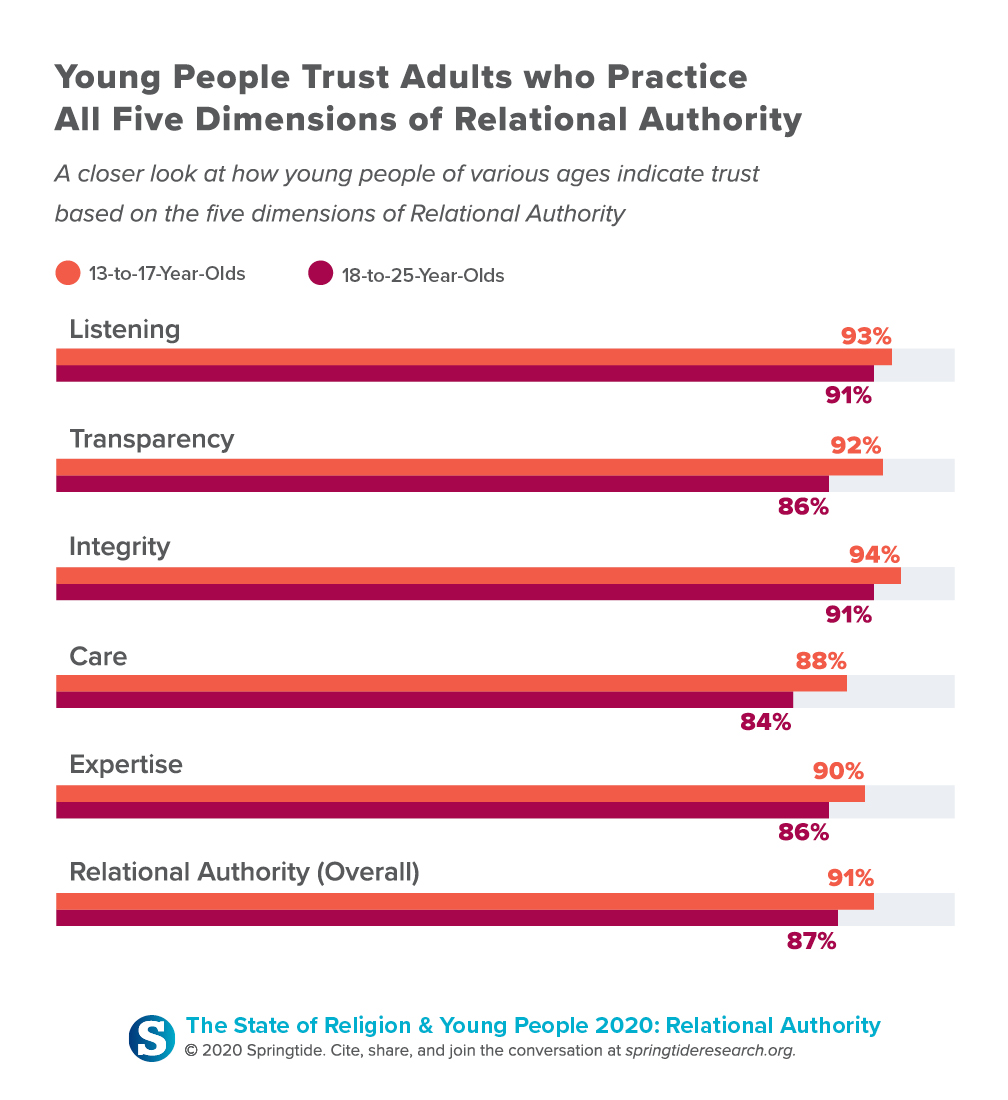
Holiday movies and Hallmark-esque plotlines aren’t the only place I’m starting to see Relational Authority at work in the world: when I reflect on my most formative teachers from high school, or when I read storybooks to my young daughter, I keep seeing and hearing the dimensions of listening, transparency, integrity, care, and expertise show up. And it makes sense: we live in a world that values relationships, and where trust is built because care is demonstrated—not earned through expertise or credentials. It makes sense I keep seeing Relational Authority, in between cups of hot cocoa and cookies, even in the most unexpected places. It reminds me of the power of naming for helping to realize the patterns that have been at work, all around us, all along.
Speaking of the holidays – how are young people planning to celebrate the various religious and secular holidays that conclude the year? We created a quick guide to help you navigate how to show you care for young people, featuring new research on rituals and relationships.
We would love to hear your stories of how Relational Authority is unfolding in your life or the lives of those you mentor. Send us an email at info@springtideresearch.org
Other readings to consider:
Belonging: Reconnecting America’s Loneliest Generation, our research report explores young people’s experience of loneliness shows how you can use our research-based Belongingness Framework to help every young person truly find a place to belong.
Meaning Making shows how young people’s values are not simply found in their religious institution building—rather they spill over into who they work for, associate with, and shop from.



